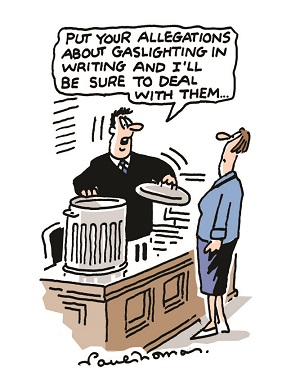Are you being gaslighted?
MiP’s caseload suggests ‘gaslighting’ is on the increase in the NHS. Here’s some tips for recognising this pernicious form of bullying and taking steps to protect yourself.

1. What is gaslighting?
Gaslighting is a serious form of psychological abuse in which someone manipulates others into questioning their sense of reality. The term derives from Patrick Hamilton’s 1938 play Gas Light, in which a young wife is manipulated by her husband into believing she is going insane. In the modern workplace, “gaslighters” bully, manipulate and control staff by using a range of tactics to deny reality.
2. Gaslighters are persistent
Gaslighting can easily be confused with incompetence, an aggressive ‘management style’ or individual incidents of abuse. But gaslighting is always a persistent pattern of behaviour, targeted at a particular person or group of people. It can make you doubt your abilities and your grip on reality and, in severe cases, you may actually feel like you’re going mad.
3. They deny reality
A gaslighting manager will typically deny things you know to be true and encourage others to join in their denial of reality. They are likely to dispute your version of events, deny things they’ve agreed, and spread or encourage rumours about you. For example, in one recent case, a manager encouraged false claims that an MiP member had no job description in order to undermine confidence in the value of their post.
4. They are deliberately inconsistent
If your manager continually changes your work objectives or instructions without a clear reason, it could be a sign that you are being gaslighted, particularly if they deny changing anything. Such deception can be quite blatant: I once had a manager who deliberately altered a written document in front of me in order to deny her previous instruction.
5. They avoid commitment
A gaslighting manager hates being tied down because it reduces their scope to manipulate reality. They will often fail to put things in writing, preferring verbal instructions and informal chats, and may claim they’re too busy to read written proposals or notes from meetings. Always ignore this and confirm everything by email – it gives you something solid to rely on if you start to doubt yourself or want to challenge your manager’s behaviour.
6. They try to isolate you
Gaslighters are likely to withhold information from you or hold meetings behind your back. They may spread rumours about you, or unfairly criticise your work in front of your colleagues. But don’t be tempted to give in to this by avoiding meetings and shutting yourself off from colleagues – that will just isolate you further.
7. They ignore procedures
Gaslighters often try to manage through chaos, ignoring policies, issuing vague or contradictory instructions and making seemingly arbitrary decisions. They will probably try to avoid doing your appraisal or setting clear objectives. Misuse of capability procedures is common: one recent case involved a member being subjected to a formal capability review – without any informal stage – despite having had no appraisal and no agreed objectives. Unsurprisingly, the only evidence presented was verbal statements from the manager.
8. Gaslighting is difficult to challenge
When challenged, a gaslighting manager will typically blame you for being “over-sensitive”, or shift the focus onto your performance (“Are you struggling to cope?”) or personal life (“Is everything all right at home?”). Formal grievances can be stressful, as gaslighters are usually adept at mobilising witnesses and manipulating evidence against the victim, so make sure you have plenty of written evidence to present. Alternatively, mediation can be a good first step: it signals that you won’t be pushed around and helps to bring evidence of gaslighting into the open – without the psychological risk of formal hearings.
9. Stick to reality
Your most important defence against gaslighting is to trust your own sense of reality. Be clear about your job description and responsibilities. Ignore gossip – just say what you’ve agreed to do (in writing) and stick to it. Write your own factual accounts of conversations with your manager as soon as possible afterwards. Try to ensure there is consistent communication between you and the gaslighter, even if it’s one-sided.
10. Get help
If you think you’re being gaslighted at work, talk to your MiP national officer as soon as possible. You can also confide in a trusted colleague, but avoid getting drawn into tit-for-tat gossip. Above all, don’t suffer in silence. Gaslighters thrive on the acquiescence of their victims, so the problem is unlikely to away on its own.
Claire Pullar is MiP’s national officer for Scotland and Northern Ireland.
Related News
-

Tipster: How to do your own quarterly review
Executive coach Jane Galloway explains how taking time to reflect on your last quarter can set you up for a brilliant next three months.
-

Tipster: How to manage in a crisis
Leadership coach and former senior detective Andy Cribbin offers his tips for managers on how to prepare for a crisis, manage calmly and deliver results that people will remember.
-

Tipster: How to restart you career after redundancy
Being made redundant or looking for work in later life can be an unsettling experience. Lucy Standing, co-founder of older workers support network Brave Starts, gives her tips on how to explore your options and boost your chances of finding the job you want.